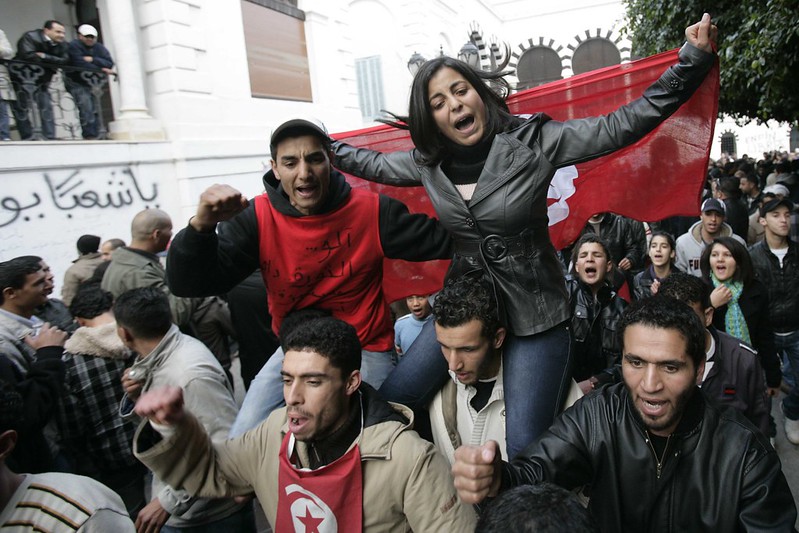It was the event that started the Arab Spring: in December 2010, a 26-year-old Tunisian street vendor named Mohamed Bouazizi fatally set himself alight in an act of despair against state corruption and brutality. This ignited a wave of popular uprisings across the region (pictured above). At Index we documented closely what happened next and we saw how it was a mixed picture, including in Tunisia. Index’s regional editor for Northern Africa at the time, Afef Abrougui, reported in 2012 on the country’s democratic transition being “in jeopardy” and freedom of expression being “under attack”. Still, for many years, hope remained that the darkest days were behind Tunisians. The country was hailed a rare, if imperfect, success of the Arab Spring. Today, sadly, no such praise can be given.
At the weekend, a Tunisian court handed down extreme prison sentences to opposition figures in a mass trial. According to their lawyer, the businessman Kamel Eltaïef was given 66 years and opposition politician Khayyām Turkī was given 48. It was another indication of President Kais Saied’s increasingly authoritarian rule.
Saied, a constitutional law professor who was democratically elected in 2019, initiated a self-coup in 2021, which ended Tunisia’s decade of democratic gains. He went on to fire nearly all government ministers, suspend parliament, create a new constitution, dissolve the independent supreme judicial council and sack dozens of judges. In addition to his political opponents, civil society and the media have since found themselves increasingly censored, though the victims extend beyond these usual targets: last year, officials from the Tunisian swimming federation were arrested for allegedly plotting against state security. Their crime? Not displaying the national flag at a competition.
At the end of 2024, Saied secured a second five-year term in office, receiving 90.7% of the vote, an easy win when the bulk of the opposition are either barred from participating or behind bars.
Despite this, many remain committed to democratic values, as was clear last September when thousands marched through the streets of Tunis to demand an end to Saied’s rule. And it’s not just on the streets that people are making their voices heard. In the latest issue of Index, we spoke to three artists whose recent works push back against Saied’s control. All of them admitted that it wasn’t easy but they are fully committed to creating art. “We need to keep speaking up,” said one.
We too need to keep speaking up – for Eltaïef, for Turkī and for all the others who continue to be punished for daring to dissent.






